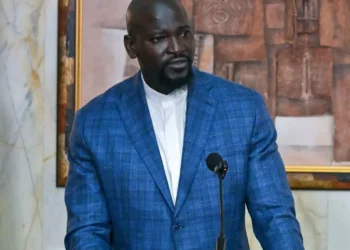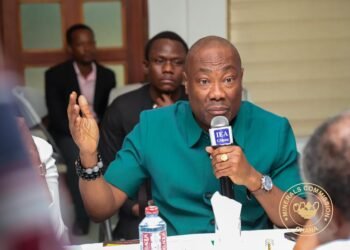Ahmed Ibrahim, the Minister for Local Government, Chieftaincy, and Religious Affairs has announced that the government has allocated GHS 13 billion to clear arrears, with a portion set aside to settle the GHS 1.2 billion sanitation debt.
He explained that despite the significant financial burdens inherited from the energy sector, the government remained committed to addressing sanitation-related debts.
“There seriously is a challenge and it’s because of the times in which we are.
“I confronted the minister for finance on this, and he told me that Ahmed, you are right, but the debt that we are inheriting from the energy sector alone, ECG is about 68 billion GHS, Cocobod, the same thing”
Ahmed Ibrahim, Minister for Local Government, Chieftaincy, and Religious Affairs
He recounted a discussion with the Minister of Finance, who acknowledged the challenges but emphasized that the energy sector’s debts far exceeded those of sanitation.
Given these pressing financial obligations, the sanitation and pollution levy has been incorporated into the Energy Sector Levy to help address the broader fiscal challenges.
Nevertheless, Ibrahim assured that part of the GHS 13 billion allocated for arrears would be directed toward the sanitation debt.
More MMDCEs Announcements
In addressing concerns about the appointment of Metropolitan, Municipal, and District Chief Executives (MMDCEs), Ibrahim refuted claims that the process has been delayed.
He emphasized that, compared to previous administrations, the current government has acted swiftly in announcing the nominees.
“It’s the earliest in the Fourth Republic that we have brought the names of MMDCEs. In the last administration, it took them nine months”
Ahmed Ibrahim, Minister for Local Government, Chieftaincy, and Religious Affairs
He recalled that in 2021, even when the government was continuing, the list of MMDCEs was released in September.
However, under President John Dramani Mahama’s leadership, significant progress has been made within a much shorter timeframe.
Within the first month, the cabinet was formed. By the second month, the Council of State was in place. The third month saw the release of MMDCEs for eight regions, with an additional five expected within the week.
Ibrahim stressed that the government has followed a structured, four-stage process to ensure the best candidates were selected.
The ministry had been deliberate in its approach, ensuring that the nominations were thorough and aligned with the government’s broader objectives.
“The remaining 5 are coming out within this week – and 8 plus 5 is 13 so we’ll be left with only 3, and the 3 will come out the following week.
“So we said we were going to do it by the 31st of March or, latest by the 1st or 2nd week of April, and we are on course. We are still on course”
Ahmed Ibrahim, Minister for Local Government, Chieftaincy, and Religious Affairs

MMDCEs Against Illegal Mining
Turning to illegal mining, Ibrahim outlined the role of MMDCEs in combating the menace, highlighting a new collaborative approach involving chiefs and religious leaders.
He explained that the “tripartite alliance” of MMDCEs, traditional rulers, and religious leaders would work together at the local level to address illegal mining activities.
The involvement of local stakeholders, he argued, would ensure that any instances of illegal mining were promptly identified and addressed.
He made it clear that failure to act against illegal mining would have serious consequences.
“The price of failure is dismissal,” he stated, emphasizing that President Mahama had made his position clear.
He noted that the president has declared his administration would not tolerate any form of mining that went against national regulations.
This stance was communicated before Mahama assumed office and reiterated after he got to the presidency.
Amendments to L.I. 2462
Ibrahim also addressed concerns regarding the amendment of L.I. 2462, a legal instrument governing mining activities.
Some stakeholders have expressed disappointment, citing the president’s earlier promise to revoke it entirely.
In response, the Minister clarified that the amendment sought to refine the law rather than reverse the president’s commitment.
“People would definitely not be totally happy about it because the entire law was demonized, but the entire law was not that bad.
“It was that mining in the forest reserves which was inserted there that demonized the entire law, and that has now been taken out. So it will take time before people understand and appreciate what went into that”
Ahmed Ibrahim, Minister for Local Government, Chieftaincy, and Religious Affairs
He explained that the inclusion of forest reserves in the original law had been a major point of contention, as it had cast mining activities in an overly negative light.
The amendment, therefore, focused on removing the contentious provision while retaining other essential aspects of the law.
Dismissing suggestions that Mahama had reneged on his promise, Ibrahim underscored the president’s determination to build a lasting legacy.
“You know John Mahama is somebody who wants to leave a legacy now. He’s to be president for four years. So why do you think that he’ll be messing himself with some of those things?”
Ahmed Ibrahim, Minister for Local Government, Chieftaincy, and Religious Affairs
READ MORE: New SEC Boss Vows to Boost Investor Confidence and Market Awareness



















